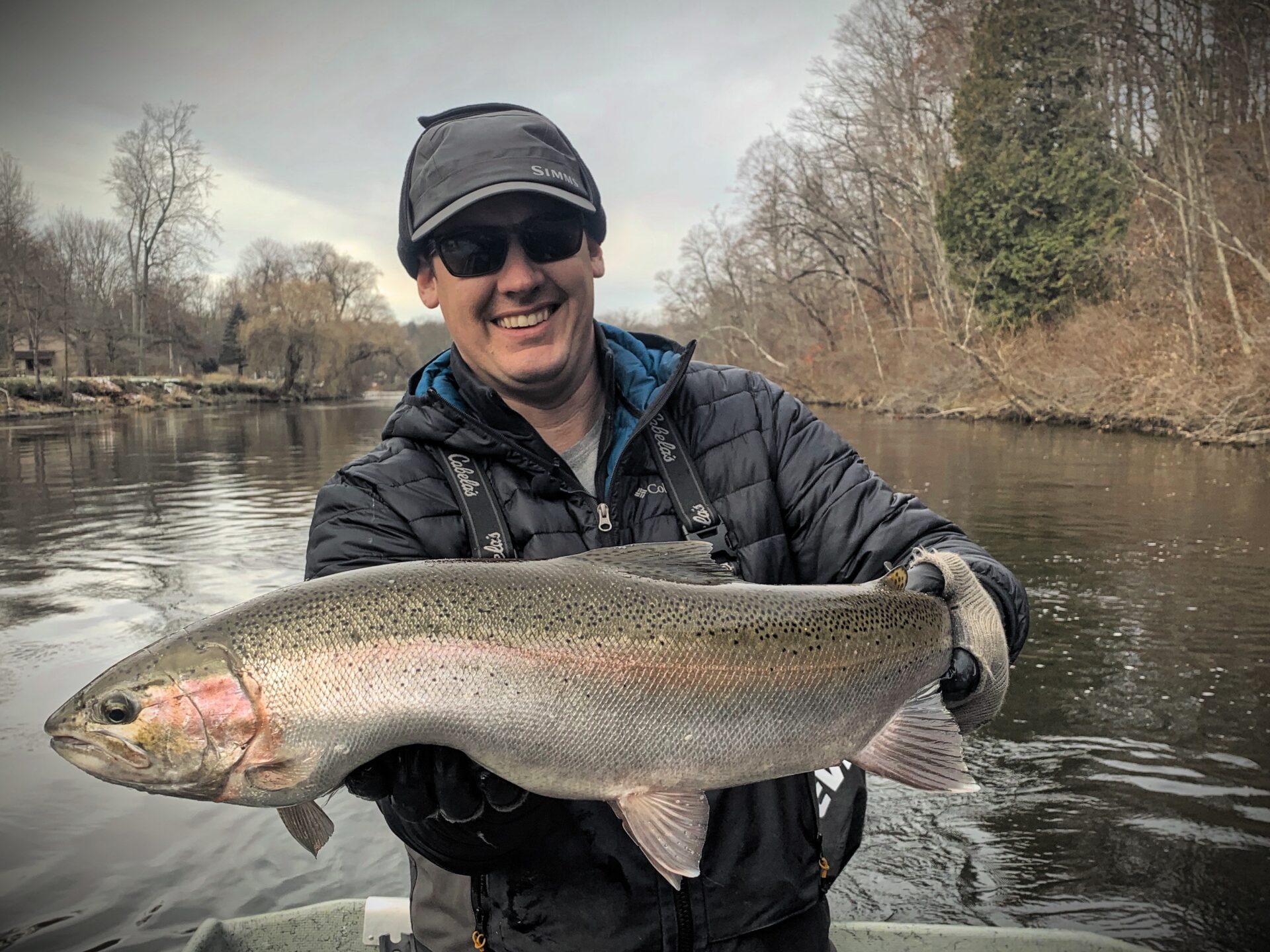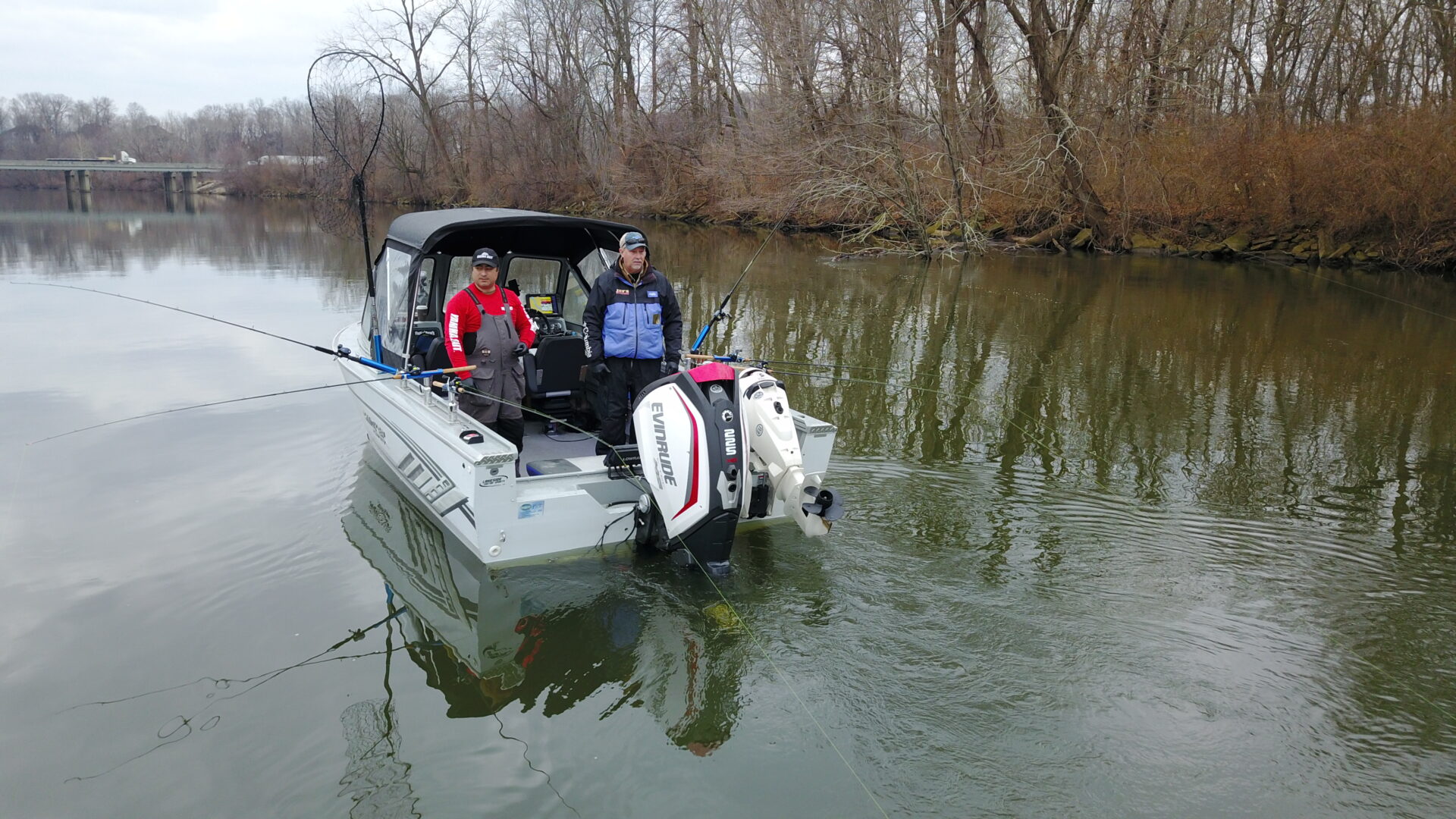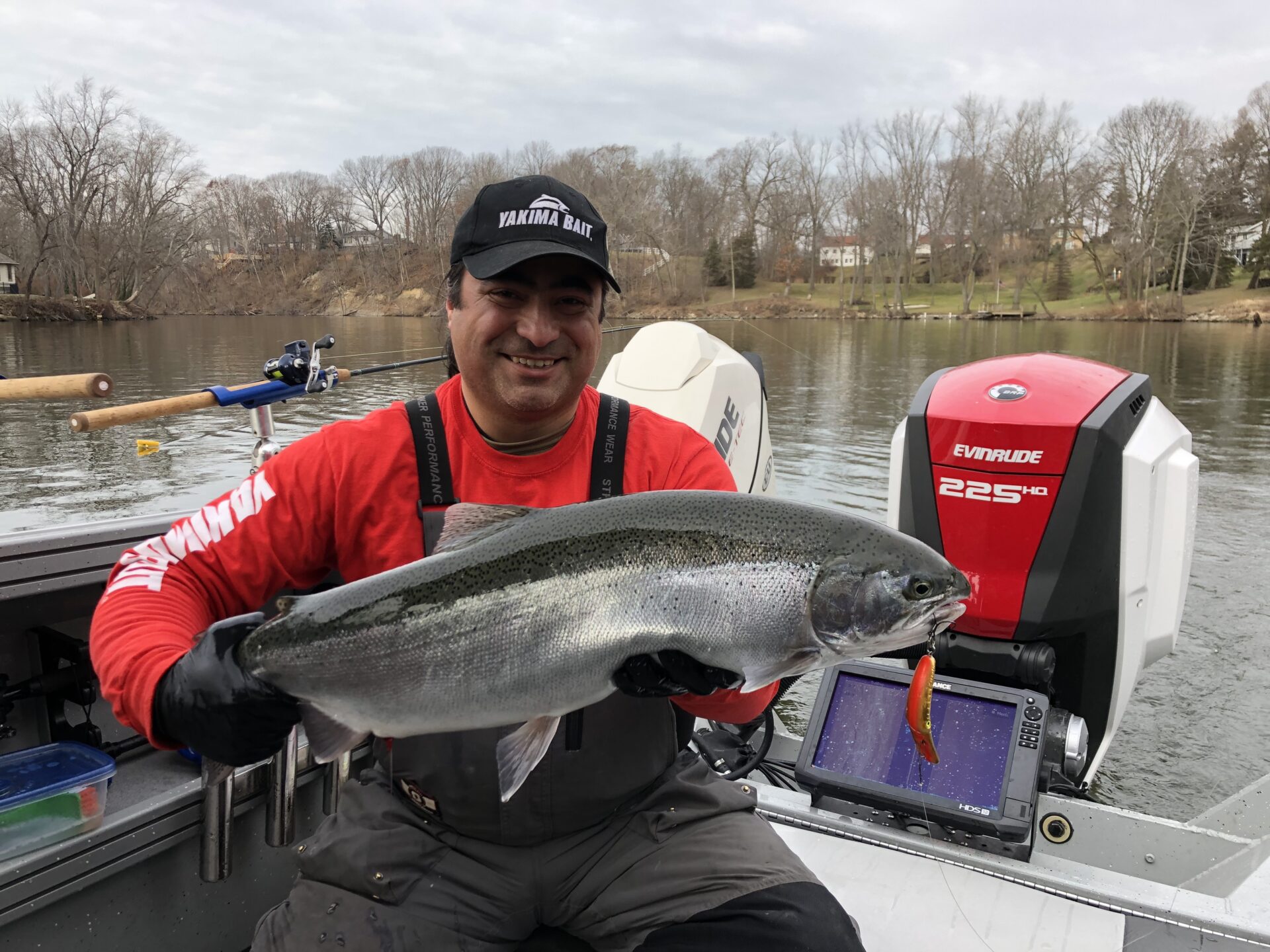Back-Trolling Plugs for Winter Steelhead
By: Mark Romanack
Back-trolling plugs is a river steelhead fishing presentation that got it’s start on the west coast where ocean run steelhead run a host of tributaries. These days, the art of back-trolling has penetrated every major river fishery were steelhead make fall, winter and early spring river spawning runs.
The art of back-trolling involves presenting several wobbling plugs downstream of a drift boat, jet sled or small skiff. The effectiveness of this unique presentation is legendary, but there are some do’s and don’t every angler should know about back-trolling plugs.

Gabe Dennison poses with a beautiful hen steelhead he caught back-trolling a 2.5 Mag Lip.
BOAT CONTROL
Back-trolling with plugs in rivers is a game of boat control. Anglers who are skillful at moving the boat in such a way as to steer their plugs into productive water are treated to explosive strikes. The traditional way to control a boat for back-trolling is to use a smooth bottom drift boat equipped with oars to manually slow down the boat’s drift while allowing the current to bring wobbling plugs to life.

Back-trolling plugs is a game of boat control. In this picture Mark Romanack and Josh Crabtree use a bow mounted electric motor to control the boat while back-trolling Mag Lip on the St. Joe River in Southwest Michigan. Using the “anchor” and “jog” features on the electric motor key fob, the boat can be held steady or moved upstream, downstream or laterally at the touch of a button.
Anglers who are skillful at rowing a drift boat or small skiff can hold the boat steady in the current and also move the boat laterally, sweeping lures across fish holding water in the process. This combined process of boat control causes the trailing plugs to speed up and slow down their action enticingly.
In addition to using oars to control the boat, most boats set up for back-trolling are also equipped with an electric anchor winch mounted to the bow that allows the anchor to be raised and lowered remotely. Many anglers mount the anchor control switch on the oar handle making it easier to raise the anchor as needed and then immediately use the oars to take over boat control.
When a fish is hooked, in many cases the angler will lower the anchor to hold the boat in place while the fish is played out. This method works nicely for most steelhead and in average current conditions, but when an exceptional fish is hooked, often the anchor must be raised and the boat allowed to drift with the current. Drifting downstream while fighting a stubborn fish makes it much easier to get the upper hand.
Oars and electric anchors are the bread and butter of back-trolling for steelhead, but a growing number of anglers are discovering the same presentation can be duplicated using larger jet sled style boats equipped with a bow mounted, GPS guided, auto-pilot style electric motor. Auto-pilot electric motors are controlled using a key fob that allows the operator to control the direction of travel, speed and even to hold or hover the boat in one spot.
Recently on the St. Joe River in southwestern Michigan, plug fishing enthusiast Josh Crabtree and yours truly used a new heavy gauge aluminum boat from SmokerCraft known as the X2 Phantom equipped with a MotorGuide Xi5 electric motor to expertly back-troll plugs. We started just upstream of the runs we wanted to fish by putting the electric motor in the water and engaging the “anchor” mode on the key fob which essentially holds the boat in place.
With the boat hovering in the current we then deployed our plugs far enough downstream that they would dive down near the bottom. Once our plugs were working nicely, we placed the rods in rod holders strategically mounted at the back of the boat to spread out the lines and cover the maximum amount of water.
Once the plugs were deployed, we used the “jog” feature on the key fob to move the boat left, right or backwards in five to 10 foot increments.
Using the “jog” feature made it easy to simply touch a button on the key fob and move the boat downstream or laterally while at the same time sweeping our lures across prime steelhead water. Holding a 18 to 22 foot jet sled style boat effectively in strong river current requires using a 24 or 36 volt electric motor.
PLUGS FOR BACK-TROLLING
When back-trolling plugs the water depth to be fished dictates the best plug options. The Mag Lip family of wobbling plug come in seven different sizes including the 2.0, 2.5, 3.0, 3.5, 4.0, 4.5 and 5.0. The most popular sizes for steelhead fishing in most rivers are the 3.0 and and 3.5 sizes. These baits easily dive six to 10 feet in strong current making them ideal for most steelhead rivers.

Josh Crabtree is a big fan of the Mag Lip 3.5 plug. He modifies his lures by removing the factory belly and tail hooks, then adds a second split ring to the back of the bait and a larger wide gap style treble hook to the tail of the bait. This rigging option prevents a powerful steelhead from gaining leverage and tearing the hook free during the fight.
Recently while back-trolling plugs with Gabe Dennison of the Yeah Pluggin’ Facebook site, we enjoyed excellent success using the smaller 2.5 Mag Lip. “I find that the smaller 2.5 Mag Lip works best in low and clear water fishing situations,” says Dennison. “The 2.5 Mag Lip only features a tail hook which also allows this bait to fish among snags much better than the larger sizes of Mag Lip which feature a belly and tail hook.”
CUSTOM PLUG OPTIONS
Back-trolling enthusiasts are always looking for ways to improve this presentation. One way to get the most from wobbling plugs is to experiment with different hooking options. The Mag Lip family of baits feature great action in both slow and fast moving water, making them ideal for custom hooking options.
“When fishing the 3.0 and 3.5 Mag Lip, I remove both the belly and tail hooks and then install a second split ring and a larger tail hook,” says Josh Crabtree. “Steelhead are one of the hardest fish to keep hooked up. Using just one hook and an extra split ring on the tail of the Mag Lip prevents hooked fish from gaining leverage and tearing free. Also, because the Mag Lip has such good action, the bait can support larger hooks with a better bite than the hooks which come standard on the baits.”
“Many anglers also opt for replacing the factory treble hooks with single Siwash style hooks,” say Jarod Higginbotham of Yakima Bait Company. “The best way to rig a Siwash hook to a Mag Lip plug is to remove the factory treble hook, then add a small barrel swivel to the split ring. Next place the open eye of the Siwash hook through the barrel swivel and use a pair of pliers to close the hook eye.”
The single hook rigging method is popular for reducing snags and when hooked fish roll and twist, they can’t gain the leverage required to throw the bait.
TIMING FISHING TRIPS
Back-trolling with plugs is a presentation that is popular among anglers who target steelhead in the fall, winter and spring. In the dead of winter, when other popular steelhead fishing methods simply don’t produce consistent results, back-trolling plugs is the “go-to” presentation of countless guides and fishing enthusiasts.
OTHER PLUGS TO CONSIDER
The aggressive wobbling action of a plug seems to drive steelhead crazy even when the water is icy cold. In addition to the Mag Lip family of plugs, the U20 and T4 FlatFish are also noteworthy plugs for back-trolling steelhead. The 1/4 and 1/2 ounce sizes of the Fat Wiggler are also good choices for back-trolling.
All of these plugs are produced in a wide variety of popular steelhead colors including both painted and metallic finishes.
SUMMING IT UP
Back-trolling plugs for steelhead works anywhere that steelhead run rivers in the fall, winter and spring. Back-trolling is not only effective, it’s a very comfortable way to fish especially when ole man winter comes a calling.
EDITOR’S NOTE: Mark Romanack is a Michigan based outdoors writer and the executive producer of the Fishing 411 TV show that broadcasts on Sportsman Channel, World Fishing Network and also Sportsman Canada.
To watch more!
